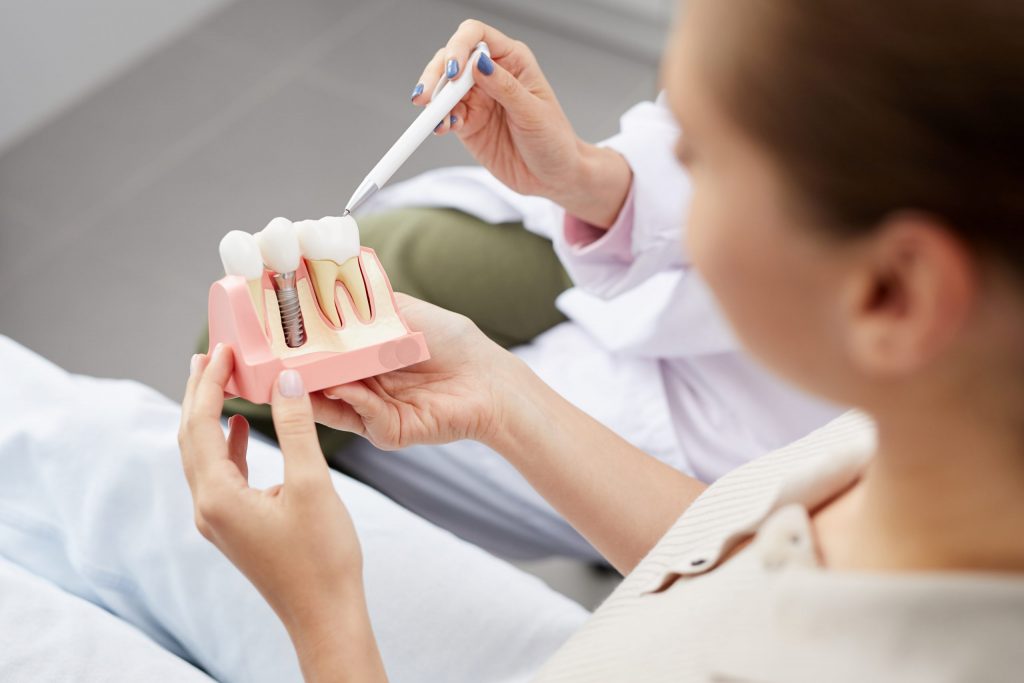Crafting hypo-allergenic dental implants has been a regular, safe, and consistent part of dentists’ work since 1965. Yet many prospective patients know very little about dental implants. This lack of knowledge can lead to worries about the safety of implants and the implantation process.
The quick answer to the question “Are dental implants safe?” is, yes, they are safe. If you are curious about dental implants and their safety, here’s what you need to know.
Materials
Dental implants have an almost 100 percent success rate. One of the key reasons for this is that they are made of titanium.
Titanium is uniquely biocompatible. This means that it is welcomed by and cooperative with your body. Unlike other metals which can corrode, cause inflammation, or degrade over time, titanium:
- Is durable
- Does not cause irritation to your jaw or gums
- Is accepted by your body’s bones as if it were a naturally occurring substance
Titanium implants require no special care to maintain. As long as you stick to a standard dental hygiene plan, your implants will remain safe and reliable for many years.
Similarly, the dental-grade porcelain and other materials that we use to make crowns for permanent dental implants are durable, non-toxic, and body-friendly. They, too, require only the usual brushing and routine dental visits to maintain their quality, appearance, and functionality long-term.
Implantation Process
Our dental implantation process is designed to protect your safety and provide you with maximum convenience and comfort from start to finish.
The process begins with a complete dental exam conducted by a capable and experienced periodontist on our team. He or she will perform x-rays and take 3D images of your mouth and teeth. They will also discuss your medical history with you.
This in-depth look at your health and teeth enables us to:
- Develop a customized treatment plan best suited to your personal needs
- Identify any risk factors that may make dental implants inappropriate for you at that time
- Identify and put in place extra protections where necessary to accommodate any pre-existing conditions you may have
For example, some patients with qualifying heart conditions need a course of antibiotics prior to having dental implantation surgery to minimize the likelihood of infections. Our thorough preparatory process means that we are able to recognize needs like that and ensure you receive the best possible care at every step of the way.
Anesthesia
In most cases, dental implant patients only need a local anesthetic to numb the portion of their jaw where the implant is being installed. Administering a local anesthetic is a very low-risk procedure.
Patients who request sedation or more extensive anesthesia are monitored by our trained and experienced team throughout the procedure for safety.
Minimally Invasive
Getting dental implants is a quick and minimally invasive procedure. Single implants can be installed in less than an hour during outpatient surgery. Only the gums and jawbone immediately linked to the tooth being replaced are affected. Patients then have extensive time to fully heal before any additional work is done.
This keeps total stress on your body as low as possible.
Long-Term Durability
Properly cared for, dental implants last for decades. They will not break, corrode, shift, or otherwise cause discomfort or damage to your mouth.
Unlike dentures and other removable prosthetics, they also will not irritate your gums, jaw, or other teeth. This means that they do not create opportunities for injury, infection, or the introduction of foreign matter into your gums or bloodstream.

Talk to a Periodontist In Phoenix, AZ
One of the best Periodontists in Phoenix, AZ, is available to answer your questions about dental implants. Schedule a consultation with Dr. Trujillo or give us a call. We look forward to meeting you.
Getting Dental Implants Is Safer Than Not Getting Them
Dental implants are not just safe. In most cases, getting implants is far safer than not getting them.
Although many patients don’t realize it, there are very real risks to simply going without missing teeth. Dental implants help patients avoid these hazards.
Jawbone Deterioration
When you lose teeth for any reason, either naturally or through intentional removal, your jawbone begins to deteriorate around the area where the missing teeth used to be. Capillaries shrivel up, cutting off the flow of nutrients. This causes the bone to weaken and break more easily.
This, in turn, causes other teeth nearby to grow weaker, compounding and spreading the problem. Dental implants stimulate your jaw and gums the same way that a natural tooth would. This significantly increases your likelihood of keeping your jaw, gums, blood flow, and other teeth healthy and intact.
Distributed Pressure
When you are missing teeth, the other teeth nearby are subject to uneven and abnormal pressure every time you bite or chew. This can lead to them breaking, shifting, or deteriorating faster than normal. Dental implants absorb pressure and distribute it appropriately around your mouth, protecting your remaining teeth.
Risk Factors
Dental implants are very safe, but they are not for everyone. Some pre-existing health conditions can make it hard for your body to handle any form of surgery or healing. Other conditions place your body under a great deal of stress and we may recommend allowing yourself to heal from or finish addressing them before undergoing dental implantation.
Examples of conditions or risk factors that may preclude you from getting dental implants include:
- Having cancer
- Being a heavy smoker
- Being pregnant
- Having an active infection, particularly in or around your mouth or sinuses
- Nerve damage to your face, gums, or mouth
- Severe bone loss
Many of these risk factors are temporary. Even serious and complex risk factors such as bone loss do not necessarily prevent all patients from qualifying for or succeeding with dental implants. Our experienced team can help you identify any risk factors that apply to you and assist you in making an informed decision about the appropriateness of dental implants for your needs.
Are Dental Implants Right for You?
If you think dental implants might be right for you, you’re no doubt wondering “where can I get more information on dental implants near me?” If so, we’re here to help. Use our convenient online form to request an appointment or call us today at (602) 995-5045.
Our qualified team can set you up for a thorough evaluation and consultation to find out if dental implants are right for you.

Don’t Let Tooth Loss Hold You Back
Call Dr. Trujillo in Phoenix, AZ, for a personalized treatment plan! We want you to feel confident and smile your best. Call today!





